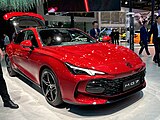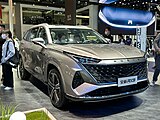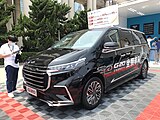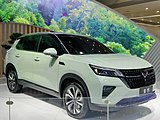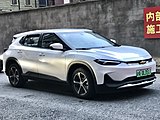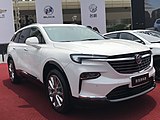SAIC Motor
 | |||||||
 SAIC Building, which is the administration headquarters, Jing'an District | |||||||
Native name | 上海汽车集团股份有限公司 | ||||||
|---|---|---|---|---|---|---|---|
| Formerly | Shanghai Automotive Industry Corporation | ||||||
| Company type | State-owned | ||||||
| SSE: 600104 | |||||||
| Industry | Automotive | ||||||
| Founded |
| ||||||
| Headquarters | , China | ||||||
Area served | Worldwide | ||||||
Key people | |||||||
| Products | Automobiles | ||||||
Production output | |||||||
| Revenue | |||||||
| Total assets | CN¥ 990,107,381,169 (2022) | ||||||
Number of employees | 215,999 (2022) | ||||||
| Parent | Shanghai State-owned Assets Supervision and Administration Commission (62.69%) | ||||||
| Divisions | |||||||
| Subsidiaries | List
| ||||||
| Chinese name | |||||||
| Simplified Chinese | 上海汽车集团股份有限公司 | ||||||
| Traditional Chinese | 上海汽車集團股份有限公司 | ||||||
| Literal meaning | Shanghai Automotive Group Joint-stock Limited Corporation | ||||||
| |||||||
| Abbreviation | |||||||
| Simplified Chinese | 上汽集团 | ||||||
| Traditional Chinese | 上汽集團 | ||||||
| |||||||
| Website | saicmotor.com | ||||||
| Footnotes / references [2][3] | |||||||
SAIC Motor Corp., Ltd. (formerly Shanghai Automotive Industry Corporation) is a Chinese state-owned automobile manufacturer headquartered in Anting, Shanghai. Founded in 1955,[4] it is currently the largest of the "Big Four" state-owned car manufacturers of China ahead of FAW Group, Dongfeng Motor Corporation, and Changan Automobile, with sales of 5.02 million vehicles in 2023.
The company traces its origins to the early years of the Chinese automobile industry in the 1940s, and SAIC was one of the few carmakers in Mao's China, making the Shanghai SH760.[5] Currently, it participates in the oldest surviving sino-foreign automotive joint venture with Volkswagen (SAIC-Volkswagen) since 1984, and in addition operates a joint venture with General Motors (SAIC-GM) since 1998. It also produces and sells passenger vehicles under its own branding, such as Roewe, MG, Maxus/LDV, Rising Auto, and IM Motors. It is also the largest shareholder of SAIC-GM-Wuling (SGMW), a joint venture selling Wuling and Baojun branded vehicles. In 2021, SAIC self-owned brands contributes 52% of SAIC's sales.[6]
The company ranked 84th on the Fortune Global 500 list in 2023. Including SGMW, it was also the third-largest plug-in electric vehicle (battery electric and plug-in hybrid) company and second-largest battery electric vehicle manufacturer in the world, with 10.5% and 13% global market share respectively in 2021.[7]
History
[edit]
Origins to 2000
[edit]Although it has a long history, originating from an automobile assembly factory established in Shanghai sometime around World War II, SAIC, unlike domestic rivals FAW Group and Dongfeng Motors, has only recently attained a position of prominence in the Chinese vehicle industry.[8] A small company in the 1970s,[9] SAIC owes its rise to more than an increase in domestic demand for passenger vehicles.[citation needed] A cooperative agreement made with Volkswagen in 1984[10] followed by the formal establishment of Shanghai Volkswagen Automotive Co Ltd in March 1985[11] allowed it to produce competitive cars with foreign technology. Early success at SAIC were a result of guidance provided by local Shanghai authorities; at one time SAIC was simply an extension of the Shanghai Municipal government.[12] For these two reasons and more, SAIC grew swiftly. In the 11 years leading to 1996, annual production capacity increased ten-fold to 300,000 units/year, and the company established itself as one of the leading Chinese automakers.[13]
During this period, SAIC effectively built an entire modern automotive component supply chain in Shanghai from scratch,[14] and the number and quality of locally produced auto parts rose significantly.[15] Cars that were previously assembled in China from knock-down kits provisioned by Volkswagen[16] became products built from parts produced in Shanghai,[17] and between 1990 and 1996 the city more than doubled its contribution to the national output of automotive components.[15] In 1987, the only local parts used in one car, the Volkswagen Santana, were tires, radio, and antenna,[18] but by 1998 over 90% of the components used in its manufacture were locally sourced.[17] A goal set by the Shanghai Municipal government,[12] creation of a local parts industry is an example of the influence that the local government has had on the development of SAIC.
In June 1997, SAIC formed a second major joint venture, Shanghai General Motors Co Ltd, with General Motors.[11][19] The new joint venture began operations in 1998, and helped to drive a doubling in SAIC's vehicle production between 2000 and 2004.[20] SAIC also created joint ventures with component suppliers, such as the American Visteon.[21]
2000 to 2010
[edit]At the start of the 2000s, SAIC made several acquisitions in Korea. In 2002 it participated in GM's purchase of Korean automaker Daewoo, acquiring a 10% stake in the newly formed GM Daewoo company for US$59.7 million,[22] and in 2004 it also assumed control of an ailing South Korean automaker, SsangYong Motor, paying US$500 million for 48.9% ownership of the company.[23] Around this time SAIC created a new holding company for its subsidiaries employed in passenger car production, Shanghai Automotive Group.[24]
In the middle of the decade, SAIC attempted to acquire the British automaker MG Rover, but in 2005 was outbid by another Chinese automaker, Nanjing Automobile.[25] SAIC did manage to obtain some MG Rover technology that was incorporated into a new line of luxury sedans sold under the Roewe marque,[26] and it subsequently purchased the winning bidder.[27]
While the company saw sales success in the late 2000s, with 2.72 million vehicles sold in 2009,[28] its 2004 purchase of an ownership stake in a Korean SUV-maker, Ssangyong, soured. In January 2009, after an additional US$45 million was provided to it by SAIC, SsangYong Motor Company was placed into receivership in Korea.[29] Courts might have mandated SAIC reduce its ownership, and by 2010 a 51.33% share of the Korean company had become a 10% one.[30] The 2009 Ssangyong failure also saw riot police quell protesting Ssangyong workers who staged a 77-day-long sit in.[31]
2010 to present
[edit]In 2010, SAIC produced 3.58 million units, the largest output of any China-based automaker that year.[32]
In June 2010, Magneti Marelli and Shanghai Automobile Gear Works (SAGW) officially launched a new joint venture plant in the Jiading district near Shanghai, China. SAGW, the main Chinese manufacturer of transmissions for the automotive sector, is a subsidiary of SAIC Motor.
In February 2011, SAIC unveiled a new commercial vehicles marque, Maxus.[33]
In 2011, SAIC produced 3.97 million vehicles, the largest output of any China-based automaker that year.[34]
In 2012, SAIC retained its top spot among domestic rivals by producing around 3.5 million units.[35]
In 2023, SAIC received the equivalent of US$560 million in state subsidies.[36] In July 2023, Audi and SAIC Group announced their partnership that the EV platform from IM Motors will be introduced into Audi's electric models.[37]
In September 2023, the European Commission (EC) launched an anti-subsidy investigation into Chinese electric vehicle manufacturers, including SAIC which exported electric vehicles in high volume under the MG brand to the region.[38] In June 2024, the EC completed its investigation and announced new tariffs for Chinese-built electric vehicles (on top of an existing 10 percent tariff for all foreign-made vehicles regardless of engine type), which went into effect on 4 July 2024.[39] Electric vehicles made by SAIC Motor would be subjected to the highest tariff of 38.1 percent.[40] On 26 June, after receiving more information, the EU reduced the proposed tariffs from 38.1 percent to 37.6 percent for SAIC.[41][42] The tariffs subjected to SAIC vehicles are the highest among Chinese electric vehicle manufacturers that are affected.[40][43] SAIC released a statement condemning the decision, noting that the tariffs are a form of unfair market discrimination that went against the principles of free trade.[44]
In July 2024, SAIC Motor issued a statement stating that it would formally request the European Commission to hold a hearing on the anti-subsidy investigation. The company claimed that the European Commission's investigation asked SAIC to disclose its commercially sensitive information including battery-related chemical formulas, which SAIC declined as it is beyond the scope of a normal investigation.[45][46][47]
In November 2024, SAIC Motor Passenger Vehicle, the subsidiary of SAIC, announced to roll back the Rising Auto brand into Roewe, ending its history as an independent brand. Rising would turned into a premium electric product line under Roewe.[48][49]
Mergers and company name-changes
[edit]The present-day SAIC is the product of numerous mergers and corporate restructurings.
- In December 1955, Shanghai Internal Combustion Engine Components Company was founded.[11]
- In March 1958, Shanghai Internal Combustion Engine Components Company and Shanghai Powertrain Equipment Manufacturing Company were merged into Shanghai Powertrain Machinery Manufacturing Company.[11]
- In January 1960, Shanghai Powertrain Machinery Manufacturing Company was renamed Shanghai Agricultural Machinery Manufacturing Company.[11]
- In April 1969, Shanghai Agricultural Machinery Manufacturing Company was renamed Shanghai Tractor Industry Company. Shanghai Automobile & Tractor Company was established in July 1984.[11]
- In March 1990, Shanghai Automobile & Tractor Company was renamed Shanghai Automotive Industry Corporation.[11]
- In September 1995, Shanghai Automotive Industry Corp (Group) was founded.[11]
-
2011–2021 logo of SAIC
-
1995–2011 logo of SAIC
Brands
[edit]SAIC sells vehicles under a variety of brands. Brands that are considered "self-owned" by SAIC include IM, Maxus, MG, Rising Auto, Roewe, Baojun, Wuling, Hongyan, and Sunwin.[50]
IM
[edit]SAIC launched a luxury EV brand "IM" (dubbed "Zhiji Motor" in Chinese) jointly developed with Shanghai's Pudong New Area government and Alibaba on January 13, 2021. According to SAIC Motor, "IM" stands for Intelligence in Motion.[51]
MG
[edit]MG Motor designs, develops and markets cars sold under the MG marque.
Roewe
[edit]Roewe was introduced by SAIC in 2006. It is sold in most export markets outside China under the MG Motor marque.
Rising Auto
[edit]Rising Auto was originally the "R Brand" in 2020,[52] an offshoot of SAIC's Roewe brand for electric vehicles. It was operated as an independent brand since 2021 but rolled back into Roewe in 2024. It is currently positioned as Roewe's premium product line.
Maxus
[edit]Maxus was formed in 2011 following the acquisition of LDV Group by SAIC in 2010,[53] and produces MPVs, pickup trucks, and SUVs for both domestic sale and global export.
Wuling/Baojun (SAIC-GM-Wuling)
[edit]A joint venture between SAIC, General Motors, and Guangxi Automobile Group (previously Wuling Group) Based in Liuzhou, Guangxi Zhuang Autonomous Region, in southwestern China, it makes commercial and consumer vehicles sold in China under the Wuling and Baojun brands. SGMW has recently found great success as an electric vehicle manufacturer — in 2021, the venture's Wuling Hongguang Mini EV city car was the best-selling electric car in China by volume.[54]
Hongyan
[edit]SAIC Hongyan was established in January 2003 as Chongqing Hongyan and traces its origins back to a Chinese manufacturer established in 1965. The company is focused on producing heavy trucks.[55]
-
Hongyan Genlyon
Sunwin
[edit]SAIC Sunwin is a brand specialized in producing passenger buses[56] and trolleybuses.[57]
-
Sunwin iev10
-
Sunwin SWB6120V4LE, based on Volvo B7RLE chassis
Nanjing Iveco Auto Co Ltd (New Naveco)
[edit]In 2021, SAIC announced an increase in its holdings of Nanjing Iveco (Naveco). SAIC's subsidiary, Nanjing Automobile Group holds a 50% stake, while SAIC itself holds 30.1%, and IVECO S.P.A. holds 19.9%. SAIC's ownership of Naveco has now risen to 80.1%, making the Italian brand a strategic investor.[58]
-
Iveco Daily Ousheng
Joint ventures
[edit]SAIC participates in cooperative efforts with foreign automakers that see the products of large international companies such as General Motors and Volkswagen made and sold in China.
SAIC Volkswagen Automotive
[edit]A joint venture between SAIC and Volkswagen Group. It was founded in 1984 and produces cars under the Volkswagen, Skoda, and Audi brands.
-
Volkswagen Lavida
-
Skoda Octavia Pro
-
Audi A7L
SAIC General Motors
[edit]This joint venture between SAIC and General Motors manufactures and sells Chevrolet, Buick, and Cadillac brand automobiles in Mainland China.
-
Chevrolet Menlo
-
Buick Enclave II
-
Cadillac CT6
SAIC-Charoen Pokphand
[edit]SAIC produces MG Motors vehicles through this joint venture with Charoen Pokphand for their Thailand subsidiary.[59]
Technomous
[edit]Established with Austrian technology provider TTTech in 2018 for Intelligent and Autonomous Driving solutions.[60]
Sales
[edit]| Total | IM | SAIC Passenger Vehicle | Maxus/LDV | SAIC-GM-Wuling | Hongyan | Sunwin | Naveco | ||||
|---|---|---|---|---|---|---|---|---|---|---|---|
| MG | Rising | Roewe | Wuling | Baojun | |||||||
| 2010 | 1,424,513 | - | 29,603 | - | 131,027 | - | 1,157,258 | - | 33,258 | 3,098 | - |
| 2011 | 1,433,387 | - | 50,349 | - | 112,825 | 2,833 | 1,210,824 | 21,854 | 31,500 | 3,152 | - |
| 2012 | 1,659,973 | - | 79,343 | - | 122,952 | 7,076 | 1,503,868 | 80,323 | 17,008 | 3,250 | - |
| 2013 | 1,884,112 | - | 83,896 | - | 152,705 | 11,032 | 1,349,964 | 100,500 | 28,008 | 3,783 | - |
| 2014 | 2,051,240 | - | 64,651 | - | 126,590 | 21,016 | 1,628,493 | 181,586 | 25,000 | 3,866 | - |
| 2015 | 2,272,961 | - | 83,294 | - | 99,350 | 35,071 | 1,541,516 | 502,872 | 8,708 | 2,103 | - |
| 2016 | 2,533,586 | - | 98,714 | - | 241,026 | 46,145 | 1,369,618 | 760,559 | 15,517 | 2,007 | - |
| 2017 | 2,811,224 | - | 158,574 | - | 385,235 | 71,117 | 1,138,726 | 1,016,342 | 40,017 | 1,213 | - |
| 2018 | 2,957,136 | - | 270,647 | - | 466,608 | 84,017 | 1,197,932 | 879,077 | 58,037 | 818 | - |
| 2019 | 2,621,117 | - | 298,000 | - | 428,597 | 153,024 | 1,078,234 | 604,026 | 58,077 | 1,159 | - |
| 2020 | 2,575,775 | - | 310,000 | - | 384,321 | 192,617 | 1,184,088 | 422,550 | 80,077 | 2,122 | - |
| 2021 | 2,845,309 | - | 471,992 | 14,241 | 343,283 | 232,844 | 1,470,783 | 214,947 | 63,007 | 825 | 33,387 |
| 2022 | 2,779,123 | 5,000 | 571,887 | 29,780 | 286,018 | 214,155 | 1,524,960 | 105,084 | 13,107 | 2,009 | 27,123 |
| 2023 | 2,804,845 | 38,253 | 903,789 | 21,012 | 145,437 | 226,664 | 1,376,490 | 51,641 | 41,559 | ||
| Due to SAIC only disclosing the combined sales figures for the MG, Rising, and Roewe brands as "SAIC Passenger Vehicle", the individual sales figures for Rising and Roewe are derived from the registered numbers in China (as these two brands are exclusively sold in China currently). The separate sales data for MG brand is calculated as the "Rising registered number" plus "Roewe registered number" minus the "total sales of SAIC Passenger Vehicle", potentially resulting in some discrepancies to the actual data. | |||||||||||
Overseas markets
[edit]
UK
[edit]On 13 April 2011, vehicle assembly resumed at the MG Motor UK Longbridge plant as the first MG 6 to be produced in the United Kingdom came off the production line,[66] but ended in 2016 when SAIC moved production to China.[67] It retains a technical subsidiary SAIC Motor UK on site.
Philippines
[edit]On July 19, 2023, SAIC's Philippines subsidiary SAIC Motor Philippines, Inc. has appointed the new distributor and importer of MG vehicles and services in the country with launch of the all-new 2024 MG4 EV and MG Marvel R for the local market by October 2023. Aside from importation, distribution, and aftersales operations, SMP’s functions also include the management of MG’s dealership network in the Philippines. This is currently composed of 42 authorized dealer locations and the addition of four more dealerships before the close of 2023, and a goal to have 60 MG dealerships running by 2025. [68][69]
US
[edit]In June 2012, SAIC's United States-based subsidiary Shanghai Automotive Industries Corp USA, Inc. opened a new North American Operations Center in Birmingham, Michigan.[70][71][72] The opening ceremony was attended by Rick Snyder, Governor of Michigan, Oakland County Executive L. Brooks Patterson, and senior executives from General Motors and SAIC Motor.[72] The 30,000-square-foot, three-story facility will house nearly 100 staff and focus on sourcing components.[70]
Facilities
[edit]
SAIC has numerous production facilities in China, including sites in: Chongqing, Liuzhou, Qingdao, Shanghai, Shenyang, and Yantai.[73] It also had an assembly plant in the United Kingdom, the Longbridge plant.[74] It also has a plant in Chonburi, Thailand, Cikarang, Indonesia, and Halol, India.
Research and development
[edit]SAIC operated a large research and development centre in the United Kingdom, the SAIC Motor UK Technical Centre, which as of 2012 employed around 275 engineers and 25 designers.[75] The UK Technical Centre was the principal site worldwide for the development of MG cars,[76] also playing a major role in the development of Roewe products.[77] However in June 2019, SAIC Motor closed the UK Technical Centre making over 300 engineers redundant in the process.[78][79]
See also
[edit]Notes
[edit]- ^ "SAIC MOTOR CORPORATION LIMITED Annual Report 2022" (PDF).
Upon completion of the transaction, the Group's share of net assets of Wuling Indonesia increased from 60.48% to 74.92%
- ^ "SAIC MOTOR CORPORATION LIMITED Annual Report 2022" (PDF). Retrieved 6 April 2024.
- ^ "Sales Volume". SAIC Motor. Retrieved 6 April 2024.
- ^ "SAIC Motor Corp. Ltd". Nikkei Asia.
- ^ The home team: Indigenous carmakers are working their way up Archived 13 April 2011 at the Wayback Machine economist.com, 13 November 2008
- ^ "SAIC Motor Continues to lead vehicle sales in China". SAIC Motor. 13 January 2022. Retrieved 2 April 2024.
- ^ "World's Top 5 EV Automotive Groups Ranked by Sales: 2021".
- ^ Richter, Frank-Jürgen (2000). The dragon millennium: Chinese business in the coming world economy. Greenwood Publishing Group. pp. 65–69. ISBN 9781567203530. Archived from the original on 3 June 2013. Retrieved 5 October 2016.
- ^ Richter, Frank-Jürgen (2000). The dragon millennium: Chinese business in the coming world economy. Greenwood Publishing Group. p. 66. ISBN 9781567203530. Archived from the original on 3 June 2013. Retrieved 5 October 2016.
- ^ Richter, pp. 67.
- ^ a b c d e f g h "Roewe: A homegrown brand with brilliant origin". China Economic Net. 12 January 2007. Archived from the original on 20 March 2012. Retrieved 14 April 2011.
- ^ a b Thun, Eric (2006). Changing lanes in China: foreign direct investment, local government, and auto sector development. Cambridge University Press. p. 103. ISBN 9780521843829. Archived from the original on 3 June 2013. Retrieved 5 October 2016.
- ^ Richter, Frank-Jürgen (2000). The dragon millennium: Chinese business in the coming world economy. Greenwood Publishing Group. p. 68. ISBN 9781567203530. Archived from the original on 3 June 2013. Retrieved 5 October 2016.
- ^ Yasheng, Huang (2003). Selling China: foreign direct investment during the reform era. Cambridge University Press. p. 264. ISBN 9780521814287. Archived from the original on 3 June 2013. Retrieved 5 October 2016.
- ^ a b Yasheng, Huang (2003). Selling China: foreign direct investment during the reform era. Cambridge University Press. pp. 264–265. ISBN 9780521814287. Archived from the original on 3 June 2013. Retrieved 5 October 2016.
- ^ Thun, Eric (2006). Changing lanes in China: foreign direct investment, local government, and auto sector development. Cambridge University Press. p. 102. ISBN 9780521843829. Archived from the original on 3 June 2013. Retrieved 5 October 2016.
- ^ a b Chiu, Becky; Lewis, Mervyn (2006). Reforming China's state-owned enterprises and banks. New horizons in money and finance. Edward Elgar Publishing. p. 310. ISBN 9781843767589. Archived from the original on 3 June 2013. Retrieved 5 October 2016.
- ^ Thun, Eric (2006). Changing lanes in China: foreign direct investment, local government, and auto sector development. Cambridge University Press. p. 104. ISBN 9780521843829. Archived from the original on 3 June 2013. Retrieved 5 October 2016.
- ^ "G.M. Expects Asia Deals to Raise $400 Million". The New York Times. 4 December 2009. Retrieved 12 May 2011.
- ^ Chiu, Becky; Lewis, Mervyn (2006). Reforming China's state-owned enterprises and banks. New horizons in money and finance. Edward Elgar Publishing. p. 309. ISBN 9781843767589. Archived from the original on 25 October 2014. Retrieved 5 October 2016.
- ^ "Visteon's Global Electronics Platforms Launched on Shanghai GM's Chevrolet New Sail". Visteon Corp. 25 February 2010. Archived from the original on 4 March 2016. Retrieved 4 January 2012.
- ^ "Auto Venture in Korea". The New York Times. 14 October 2002. Archived from the original on 27 May 2015. Retrieved 14 April 2011.
- ^ "SAIC Takes on Ssangyong Motors". China Daily. 29 October 2004. Archived from the original on 11 October 2012. Retrieved 14 April 2011.
- ^ "Chinese auto firm looks overseas". BBC News. 29 November 2004. Archived from the original on 8 April 2005. Retrieved 14 April 2011.
- ^ "Rover sold to Nanjing Automobile". BBC. 23 July 2005. Archived from the original on 2 November 2012. Retrieved 4 January 2012.
- ^ "China debut for Rover-based car". BBC. 20 November 2006. Archived from the original on 10 January 2014. Retrieved 4 January 2012.
- ^ "REFILE-UPDATE 2-SAIC to make MG 6 in UK, upbeat on own-brand car" Reuters, 25 November 2009
- ^ "SAIC: Company Profile". ChinaAutoWeb.com. Archived from the original on 22 July 2011. Retrieved 11 September 2010.
- ^ Kitchen, Michael (9 January 2009). "Korean auto maker Ssangyong enters receivership". MarketWatch. Archived from the original on 7 June 2011. Retrieved 4 January 2012.
- ^ For court-ordered destruction of SAIC ownership and 51.33% stake, see Seo, Eun-kyung (17 December 2009). "UPDATE 1-Court backs Ssangyong plan, shares briefly halted". Reuters. Archived from the original on 25 March 2013. Retrieved 5 January 2012.
- For 2010 ten percent stake, see "Ssangyong Motor up for sale, India's Mahindra eyes bid". Reuters. 14 May 2010. Archived from the original on 11 July 2012. Retrieved 5 January 2012.
- ^ "S Korea factory occupation ends". BBC. 6 August 2009. Archived from the original on 11 July 2013. Retrieved 5 January 2012.
- ^ China Car Market 101: Who Makes All Those 19 Million Cars? Archived 22 January 2011 at the Wayback Machine thetruthaboutcars.com, 19 January 2011
- ^ "SAIC unveils first international brand". Shanghai Automotive Industry Corporation. Archived from the original on 20 April 2011. Retrieved 15 April 2011.
- "SAIC's MAXUS Datong vying for global market". China Economic News. 12 April 2011. Archived from the original on 20 March 2012. Retrieved 15 April 2011.
- ^ 2011年前十家乘用车生产企业销量排名. China Association of Automobile Manufacturers (CAAM). 20 January 2012. Archived from the original on 20 August 2012. Retrieved 19 August 2012.
- ^ "2012年12月分车型前十家生产企业销量排名". China Association of Automobile Manufacturers (CAAM). 14 January 2013. Archived from the original on 15 January 2013. Retrieved 15 January 2013.
- ^ Douglas, Jason; Leong, Clarence (3 August 2024). "The U.S. Has Been Spending Billions to Revive Manufacturing. But China Is in Another League". The Wall Street Journal. Retrieved 5 August 2024.
- ^ "Audi officially welcomes Chinese partnership". CarExpert. 21 July 2023. Retrieved 21 July 2023.
- ^ Moens, Barbara; Busvine, Douglas (13 September 2023). "Von der Leyen hits China with electric vehicle subsidy probe". Politico. Archived from the original on 26 October 2023. Retrieved 26 October 2023.
- ^ Verhelst, Koen; Zimmermann, Antonia; Klöckner, Jürgen (12 June 2024). "EU shocks China with EV duties of up to 38 percent". Politico. Retrieved 12 June 2024.
- ^ a b Bermingham, Finbarr (12 June 2024). "Chinese-made electric vehicles slapped with up to 38% added EU import tariffs". South China Morning Post. Retrieved 12 June 2024.
- ^ Zhang, Phate (27 June 2024). "EU makes minor cut in tariff rates to be imposed on Chinese EVs, report says". CnEVPost. Retrieved 30 July 2024.
- ^ "EU said to reduce tariffs for some Chinese EV exporters". Automotive News Europe. 26 June 2024. Retrieved 30 July 2024.
- ^ Verhelst, Koen; Zimmermann, Antonia; Klöckner, Jürgen (12 June 2024). "EU shocks China with EV duties of up to 38 percent". Politico. Retrieved 12 June 2024.
- ^ "【图】名爵发布关于欧盟加征临时性关税声明_汽车之家" [MG releases statement on EU's temporary tariff increase]. Autohome. 14 June 2024. Retrieved 14 June 2024.
- ^ "China's SAIC Motor files defence to EU's preliminary EV anti-subsidy ruling". The Economic Times. 22 July 2024. ISSN 0013-0389. Retrieved 29 July 2024.
- ^ 中央通訊社 (25 July 2024). "中國上汽不服被加稅 指控歐盟要求交出商業機密 | 兩岸". 中央社 CNA (in Chinese). Retrieved 29 July 2024.
- ^ "上汽回应欧盟委员会反补贴调查:拒绝提供商业敏感信息". tech.ifeng.com (in Chinese). Retrieved 29 July 2024.
- ^ "上汽乘用车变阵:飞凡结束单飞,荣威押宝混动". finance.sina.com.cn. 12 November 2024. Retrieved 16 November 2024.
- ^ "结束"单飞",飞凡重新回归成为上汽荣威高端产品系列". www.yicai.com. Retrieved 16 November 2024.
- ^ "SAIC MOTOR". 19 December 2022. Archived from the original on 19 December 2022. Retrieved 19 December 2022.
- ^ "SAIC, Alibaba-backed premium EV brand "IM" makes world's debut". Volvo Group. 13 January 2021. Retrieved 13 January 2021.
- ^ "SAIC renamed its R brand to Feifan and sold 2000 EVs in October". CarNewsChina.com. 11 November 2021. Retrieved 19 March 2023.
- ^ "SAIC launched new brand Maxus for vans". China Car Times. 3 March 2011. Archived from the original on 22 July 2011. Retrieved 3 July 2011.
- ^ "China: Wuling Sold 29,000 Hong Guang MINI EV In June 2021". InsideEVs. Retrieved 10 September 2021.
- ^ "A LONG STANDING, STRONG, RELIABLE SINO-ITALIAN TEAM". Iveco. Archived from the original on 12 May 2011. Retrieved 14 July 2011.
- ^ "1,500 buses from Volvo to World Expo". Volvo Group. 28 April 2010. Archived from the original on 25 March 2013. Retrieved 12 February 2012.
- ^ "New and improved electric buses for route 26". SHINE.
- ^ "依维柯大股东变更为南京汽车,持股50% 乐居财经 王敏 10月15日,南京依维柯汽车有限公司(以下简称"依维柯")大股东从"IVECO S.P.A.,南... - 雪球". xueqiu.com. Retrieved 3 January 2024.
- ^ "CHAROEN POKPHAND GROUP". www.cpgroupglobal.com. Archived from the original on 10 September 2021. Retrieved 10 September 2021.
- ^ "SAIC MOTOR". www.saicmotor.com. Retrieved 11 June 2021.
- ^ "HOME | Automotive Industry Portal MarkLines | Portal". www.marklines.com. Retrieved 2 December 2022.
- ^ "上汽集团官网". www.saicmotor.com. Retrieved 15 January 2023.
- ^ "2022年中国车销量排行榜,中国车销量查询 - 车主之家". xl.16888.com. Retrieved 10 March 2023.
- ^ "上汽集团销量查询,上汽集团销量排名,上汽集团历史销量查询 - 车主之家". xl.16888.com. Retrieved 11 January 2024.
- ^ "上汽集团销量查询,上汽集团销量排名,上汽集团历史销量查询 - 车主之家". xl.16888.com. Retrieved 11 January 2024.
- ^ "New MG Sports Rolls Out Of Longbridge Plant". Sky News. 13 April 2011. Retrieved 14 April 2011.
- ^ "MG to end UK car production at Longbridge with switch to China". BBC. 23 September 2016. Retrieved 14 March 2022.
- ^ "SAIC Motor Philippines Takes Over MG Brand, To Launch 3 Full EVs By Q4 2023". CarGuide.ph. 21 July 2023. Retrieved 20 July 2023.
- ^ "SAIC Motor to launch 2024 MG Marvel R, MG ZS EV, MG4 EV in PH". AutoIndustriya.com. 21 July 2023. Retrieved 19 July 2023.
- ^ a b "China's Shanghai Automotive Industries opens office in Birmingham". Crain's Detroit Business. 28 June 2012. Retrieved 2 July 2012.
- ^ VLASIC, BILL (14 May 2013). "Chinese Creating New Auto Niche Within Detroit". pp. A1.
- ^ a b "SAIC USA Opens New North American Operations Center in Michigan". Aftermarket News. 28 June 2012. Archived from the original on 25 October 2012. Retrieved 2 July 2012.
- ^ "Introduction of SAIC". SAIC. Archived from the original on 29 May 2011. Retrieved 13 July 2011.
- ^ Pomfret, James (26 June 2011). "China's premier promotes Sino-UK trade synergies". Reuters. Archived from the original on 2 July 2011. Retrieved 13 July 2011.
- ^ "About SMTC UK". SAIC Motor UK Technical Centre Limited. Archived from the original on 26 April 2012. Retrieved 28 March 2012.
- ^ "MG". SAIC Motor UK Technical Centre Limited. Archived from the original on 26 April 2012. Retrieved 28 March 2012.
- ^ "Roewe". SAIC Motor UK Technical Centre Limited. Archived from the original on 26 April 2012. Retrieved 28 March 2012.
- ^ "Up to 230 jobs at risk as MG owners move to downsize UK base". Autocar. Retrieved 4 August 2021.
- ^ Jones, Tamlyn (10 May 2019). "Axe hangs over 140 car centre jobs in Longbridge". BirminghamLive. Retrieved 4 August 2021.
External links
[edit]- Companies in the SSE 50 Index
- SAIC Motor
- Vehicle manufacturing companies established in 1955
- Companies based in Shanghai
- Companies in the CSI 100 Index
- Companies in the FTSE China A50 Index
- Companies listed on the Shanghai Stock Exchange
- Car manufacturers of China
- Government-owned companies of China
- Multinational companies headquartered in China
- Chinese brands
- 1955 establishments in Shanghai






